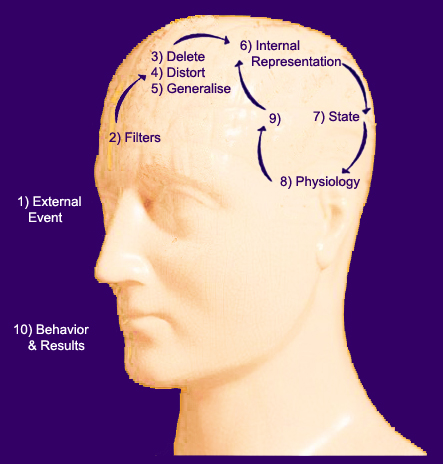If you’ve nailed the NLP Practitioner and you’ve got an itch to know more, then The NLP Master Practitioner home study programme is going to stretch your mind in ways you never before thought possible. This is NLP at a whole new, grown-up, supersonic level.
Read through the following and if you can make sense of it, you may be ready for the NLP Master Practitioner Home Study Training:
10 steps to understanding yourself
- Every second, it is estimated that your nervous system receives around 2 million bits of important sensory data about the events that are happening around you. You interpret this information via your 5 senses, visually (sight), auditory (hearing), kinaesthetic (feeling & touch), olfactory (smelling) and gustatory (tasting).
- Of course, we are not aware of 2 million things happening every second (because we’d go crazy!) so our mind filters the information into about 7 bits. To filter 2 million bits into 7 bits, it deletes some things, distorts and generalises.

- Deletions are important because they stop us from being bombarded by information that isn’t relevant at the moment. For example, as you read this, you were probably not aware of your breathing until it was brought into your awareness. If a person is depressed, they may be deleting happiness from their awareness, NLP uses a linguistic tool called the meta-model which can highlight the deletions a person is making.
- Distortions are when we use our imagination typically to make things seem better or worse. It's a form of exaggerating that allows you to turn the words you read in a book, into pictures that you see in your mind. This skill can be useful in helping us prepare for situations we have not yet experienced so that we use our imagination to practice the best possible outcome.
- Generalisations help us to relate things we are learning to what we already know. It also prevents us from having to relearn something every time we do it, such as riding a bike. Generalisations can be limiting. If a bad experience leaves us with negative beliefs, it limits our world. For example, if someone had a bad experience at the dentist, they may have the belief that all dentists are terrifying. The NLP belief change intervention will replace the disempowering belief with a more positive one.
- Using the 7 bits of information that have been filtered we recreate the outside event inside our minds. This is called an internal representation. This means that what we represent to ourselves inside our minds is never true to what is happening in the event (because we have deleted bits, distorted bits and generalised bits). We all delete, distort and generalise differently, so we all have different experiences in life.
- The things we create in our Internal Representation affect the way we feel. In NLP, we call this 'state.'
- State affects our physiology (what we do with our bodies), this is why happy people have a much more upright posture, and depressed people slouch downwards.
- State, Physiology and Internal Representations are interlinked and affect each other. This is why lucky people seem to attract more luck and unhappy people seem to attract more problems. We are designed to attract more of what we focus on.
- Our State, Physiology and Internal Representations account for the behaviour we then exhibit which affects the results we get. Good results or bad results, either way, we get results, NLP just ensures you are getting excellent ones!
Part of this programme revisits some of the NLP Practitioner material but utilising those skills on a more technical level.
The rest of the resources focus on new NLP techniques and strategies that you haven’t even heard of before.
This is what is included:
- Personal emotional values and the values of others that drive our emotional needs in our lives
- Identifying and healing values that are in conflict
- Change values
- Identify the matrix of a personality using Meta programmes
- Use Meta programmes and values in management, sales and recruitment
- Compulsion blowouts
- Advanced strategies
- How to change a persons strategy in business, therapy or relationships
- Model excellence in others and install the model within yourself.
- Advanced Conversational change and Linguistics
- Use time in your language to create movement in a stuck problem
- Change a person's beliefs using conversation
- Sleight of mouth patterns
- Meta Model III
- Experience an introduction to quantum language and how it can create personal change
- Learn the process for personal empowerment
- NLP Presentation Skills and NLP training design
- Creating metaphors
- Patterns of indirect suggestion
- The Agreement Frame
- Creating embedded commands and using hypnotic language
- Deductive and inductive language patterns
- Hypnotic healing
Our Part 1: NLP Master Practitioner Theory home study kit is made up of over 4 ½ hours of NLP audio CDs and 177 pages of meaty master practitioner manual taking you through the course contents.
It's time to take your learning to the next level with this £1668 home study programme that you can enjoy at your own pace.


